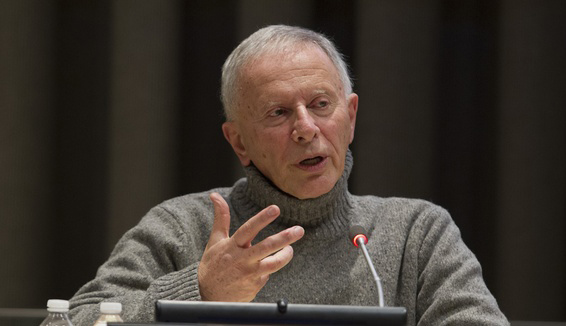Australia/Israel Review
The Last Word: Call to Action
May 29, 2015 | Jeremy Jones

Jeremy Jones
On 19 May 2015, we lost a giant of academia, world Jewry and the fight against antisemitism.
Professor Robert Wistrich, who mixed knowledge with wisdom and research with passionate advocacy, suffered a fatal heart attack.
Less than a week earlier he had delivered a powerful address to the Fifth Global Forum for Combating Antisemitism, which convened in Jerusalem. He called for a rethinking in strategies and tactics, arguing that far too many people, for far too long, had ignored the growth and potency of contemporary enmity of Jews and Judaism.
In plenary sessions, many speakers echoed his sentiments, sometimes with the powerful oratory skills of Sheikh Hassan Chalgoumi of Paris, sometimes in the disciplined tones of German Justice Minister Heiko Maas, sometimes in the action-oriented formulation of Canadian Human Rights lawyer and politician Irwin Cotler.
Having been a speaker or chair of all of the previous Global Forums and the series of high-level international conferences which preceded them, what struck me in 2015 was the degree of self-criticism and calls to rethink all that had been done and all which may have been envisaged by the Conference organisers.
It was a huge gathering, with more than 1,200 attendees from more than 80 countries – testimony to the fact antisemitism has become a broad concern and not something of direct interest only to its Jewish targets and academic specialists.
There were many non-Jewish participants, including Muslim, Christian and Druze religious leaders, diplomats, scholars, industry leaders and human rights experts.
Twelve working groups each focused on identified areas requiring specific action, while general sessions identified three matters requiring global responses – online media, religion and the potent cocktail of far-right, far-left and Islamist anti-Jewish racism and terrorism in Western Europe.
I chaired the working group focusing on interfaith activity together with Father Patrick Desbois, a prominent Catholic priest from Paris.
In 2013, the same working group had concentrated on finding best-practice examples of dialogue and collaboration. The recommendations had been sound, reasonable and practical.
With almost entirely different personnel, the 2015 working group changed tack, adopting a more urgent tone.
We identified and named a variety of sources of antisemitism, focusing on movements and individuals which selectively use religious texts to present their hatred as Holy Writ, and those who distributed and invented religious teachings to assert their bigotry reflected a Divine Will.
The most prominent criticisms of antisemitism emanating from Islamic sources came from the Muslim contributors, who included imams and academics from Europe and Asia.
Directives to act on the facilitation and enabling of antisemitism by the World Council of Churches’ networks came from Catholic and Protestant ministers and lay people from North America, Europe and Asia, while Israeli, American and Asian Jewish delegates were in the vanguard of calls for Jewish leadership to reshape approaches to religious and non-religious centres of prejudice.
The far right and far left were also identified as sources of bigotry and bullying. The approach which sees “non-violent” extremism as not merely benign but an ally against violent extremism was identified as naive, misguided and an abrogation of responsibility by political and religious leaders.
United by a commitment to the dignity of all human beings, we considered the negative impact antisemitism was having on Islam and Christianity, as it threatened the foundations of faiths predicated on ethics and morality.
We also discussed the failure of the international community not only to redress anti-Jewish manifestations, but to protect and aid the far-too-many victims of discrimination and hatred, such as Christian minorities, the Yazidis, Bahais and Rohingyas.
When the co-chairs convened after the formal programme concluded, it was obvious that the Forum achieved far more than simply providing opportunities to network and to learn from experts.
It produced guidelines to assist the hundreds of committed people present, and the many thousands of others not able to be there, for what we all acknowledged will be an enormous challenge, but one we accept with renewed vigour.
Tags: Antisemitism






